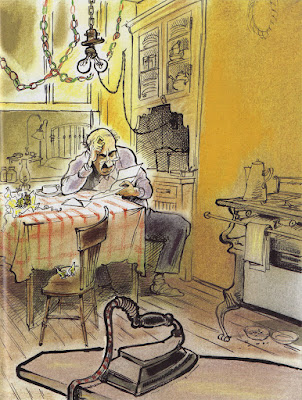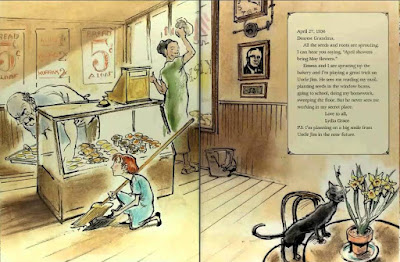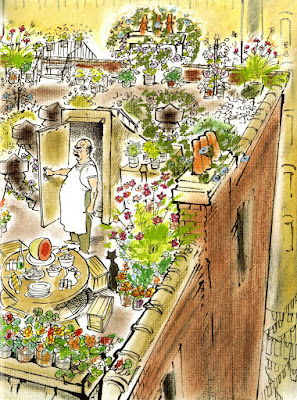 |
Today, I asked Mila's twin brother Ivan to select another special treat for you.
This time Ivan also had full freedom to choose a book for you with no instructions from me or anyone else.
What would he choose?
From our entire home library of more than a thousand children's books.
I must admit I was wondering which book would my son bring me.
My lovely son surprised me.
He chose a fantastically moving picture book - The Gardener.
We have not read it in a long time, more than half a year - I think.
Not many picture books can be defined as true classics, yet this is one of the few that belong to the select group.
The Gardener is not only recognized as fab by Ivan, but it is also a 1997 New York Times Book Review Notable Children's Book of the Year, as well as 1998 Caldecott Honor Book.
Had you asked me just five years ago, I would probably have said that a girl would have chosen The Gardener and that a boy would have chosen The Man Who Lost His Head (Mila's choice last time around).
But this error, just serves to illustrate a good point.
Reading aloud has taught me how little do we truly know about the inner life of our children.
I mean about their real selves.
Books make that inner life even more complex. Books have a crucial influence.
It is a page by page process.
Children grow into different people after coming into contact with new ideas, images, concepts.
 |
| Uncle Jim reads a poem written for him by Lydia Grace |
They evolve faster with books.
They evolve yet they still remain kids.
But they become smarter or, even better - more aware of themselves and their surroundings.
They are no longer the same person they would have been ... without children's literature.
And that is the greatest positive power that children's books have over our children.
The power of fostering self-improvement.
But, back to this fantastic book - The Gardener
It is a sobering story from the era of Great Depression (in the early 20th century).
As in every good story - all children can easily identify with the main character in this book Lydia Grace, as authored by Sarah Stewart.
Lydia Grace Finch is a young, petite girl who lives with her parents in the poverty-stricken countryside.
With her father out of work and mother earning less and less money from her dressmaking, Lydia Grace is one day sent to live with her Uncle Jim in a big gray city.
Lydia Grace is going to work for her Uncle Jim in his bakery.
Life in a large town in times of poverty is drab.
Days are depressing.
 |
| A typical double-page spread from The Gardener |
The reality of the dire situation is beautifully shown through the amazing full-page artwork created by David Small.
Ever double-page of this book consists of beautiful side-to-side artwork.
The artwork is simply fantastic!
(Interesting tidbit: The Gardener's author Sarah Stewart and illustrator David Small are married to each other and they have previously illustrated two more children's books - The Money Tree
Fortunately, many of our own kids today have not gone through this harsh reality of poverty and hardship.
But it is an important lesson to be aware of.
Yet, poverty for adults and poverty for children can be two different experiences.
We often forget that children also live in an alternative reality to ours.
This is one of the greatest powers that children have in life. It is the power of overcoming harsh reality with strength of character.
Children almost always see life as a glass half full, rarely as a glass half empty.
Green is the color of life
Lessons are not given, they are taken.
Cesare Pavese
Lydia Grace is not a child that will succumb to the pressures of daily life.
She is well grounded in her loving family life.
She does not wait for things to happen, she makes them happen.
She keeps writing back home - and the entire picture book is presented in the form of a collection of letters penned by the little girl to her family back home in rural America.
In her letters she informs her Mama, Papa and Grandma that she will start to tend plants in window boxes in the city and she thanks her family for sending her seed catalogs and flower bulbs that she will use in preparing her garden.
In each of her letters, Lydia Grace also informs her family back home that her Uncle Jim does not smile, which is a terse way of describing the difficult life that surrounds her in the city.
As months pass, Lydia Grace makes friends with the other employees of the bakery and she learns how to knead bread, while teaching others the Latin names of all flowers she knows.
 |
| Uncle Jim finds the secret garden on top of the building |
Children never meekly accept the status quo.
They have a natural instinct to follow the good and the positive, even when surrounded by gloom and even despair.
Naturally, as the economy starts to recover in May 1936, Lydia Grace informs her parents: "I saw Uncle Jim almost smile today. The store was full ... of customers".
As her plants in window boxes start to bloom and even radishes, onions and lettuce emerge to decorate the building windows, Lydia Grace becomes known by her new nickname - the gardener.
However, window boxes are not the only achievement that she has been working on.
Lydia Grace has been preparing a fantastic surprise for her overworked uncle who agreed to take her in during the dark days of the Great Depression.
The surprise is a marvelous rooftop garden that she prepared by herself for her Uncle Jim in order to bring a smile back to his face.
I love that message.
Children also love messages of hope.
We can make lemonade out of the lemons we have been dealt.
Work is not a curse in life, but also an opportunity for improvement.
But this is not all that I love about The Gardener
The sweetest thing is how this amazingly illustrated picture book defines success.
A delicate measure that should always be on our minds.
The true measure of success in life is not money, but a smile on faces that surround you.
This is not a message that you should ignore.
The Gardener is available from bookstores in the US
Amazon
The Book Depository (free worldwide shipping)
and in other countries:
Amazon UK
Amazon CA
Amazon DE

No comments:
Post a Comment